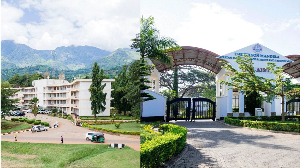I really have been living in interesting times in my country. From the official praise heaped on our poverty status, a respected Parliamentarian saying government should continue distributing our ill-fated water system, a Cabinet Minister?s attempt at invoking Ghana?s ?decency? laws to punish malnourished Ghanaian deportees for faking they were refugees from Sudan?s Dafur region, a College Professor equating slavery to ?so-called globalization? and to a traditional village Chief?s lament at the ?quantum of diseased minds that paraded through the country, overflowing in the confidence of their education, knowledge and what they perceived as the light?, I have had some good laughs.
What I find particularly piquant is the latest circus about the terms ?Foreign Aid? and ?Foreign Investment?. Kwame Avege, in an article titled ?Why Ghana Remains Under-Developed? published in the July 23rd edition of the Daily Graphic had painstakingly done just that. See http://www.graphicghana.com/article.asp?artid=1401. But he is not alone; many of our respected minds like the Chief Executive Officer of Ghana?s largest public hospital, Professor Frimpong have made similar comments recently. But I understand because I have been through that classroom before.
Firstly, Kwame Avege?s displeasure on the cyclical nature of our poverty is right. But just how do you solve poverty if you have a nationally sanctioned document like the Ghana Poverty Reduction Strategy (GPRSP) that says ?the role of government makes considerable case for the government to intervene directly in the economy? and recommends foreign aid and its appendages to ?finance? our poverty. Pages vii-viii of the GPRSP for instance, recommends that funds from on-going poverty related projects, HIPC savings, Government of Ghana sources (including the growing tax menace) additional donor support among others, should be used in costing and financing our poverty. It should interest Kwame Avege to learn that such recommendations that tie our apron strings to foreign aid money and planned policies have been our nemesis. Time and again staggering figures have been mentioned as national debt contracted mainly through loans from the Bretton Woods Institutions. Yet the reality is that many of such unaccountable loans end up in the pockets of the politicians or used for funding some electioneering gimmick that is short-lived.
A Ghanaian commentator sums up the results of foreign aid as ?dirty uncovered gutters, kids running around not going to school, cluttered heaps of rubbish burning all over; streets clogged with traffic and smoking vehicles; water shortages; sporadic electricity supply; a corrupt judiciary and even more corrupt executive branch; party politicking about nothing; small and petty-minded government officials etc; no medical delivery system to speak of; an ineffective commercial system that does not encourage private investment; a rural population that simply subsists on less than $1 per day; fraud in public transactions; a parliament of jesters who don't know what they are doing and a general helter-skelter atmosphere of incompetence and mediocrity all around.?
Most disappointingly Mr. Avege avers that ?Had the fundamental questions been asked, our economies would not have been exposed to ruthless exploitative plunder by ?foreign investment? as cure to our economic backwardness since our past points to foreign investments as the cause and not the solution?.
My presumption again is that when he talks about Africa having been underdeveloped with foreign assistance, he means foreign aid and not foreign investment.
I agree that some forms of foreign investment are crooked, but that happens when you have ignorant and corrupt bureaucrats who understand next to nothing about the rules of international business and engage in monopolistic cartels to dupe the citizenry.
Today, real foreign investment has an element of ownership and accountability of projects, whereas foreign aid still goes unaccounted for.
One of the direct causes of Africa?s impoverishment is the lack of foreign investment. Over the past 40 years the investment rate has fallen dramatically: see http://www.nber.org/digest/jan04/w9865.html
? Since 1975 the investment rate has declined to 8.5 percent of GDP. ? This is compared to 20 to 25 percent of GDP for the average developed nation and 30 percent for East Asian economies
Furthermore, most African investment was directed to inefficient and corrupt public sectors.
In their commentary on the 8th Economic Freedom of the World report, authors James Gwartney, Gus A. Stavros, and Robert Lawson specifically examine foreign direct investment (FDI), which has been shown to have a particularly powerful effect in promoting growth. Free economies attract $3,117 of foreign direct investment (FDI) per worker, compared to $444 for the median group and only $68 for the least free nations.
The economists add, ?Remarkably, the foreign direct investment per worker of the persistently free economies was more than 45 times the figure for the persistently unfree group?.
The authors say, ?Moreover, the productivity of investment is 70 percent greater in economically free nations than in unfree nations?. Mr. Avege goes on another wild goose chase when he suggests that ?Africa, and for that matter Ghana, are under-developed because they have been colonized in the past, either directly or indirectly by external powers?. I?m wondering if a country like South Korea was not colonized? At Independence Ghana?s income per capita was almost exactly equal to South Korea's at $490 (in 1980 dollars). Our own economic books reflect that by the early eighties, however, South Korea's income per capita had risen fourfold, while Ghana's had actually fallen over 20 percent to $400 per head. Investment slumped from 20 percent of GDP in the fifties to 2 percent by 1982, and exports dropped from more than 30 percent of GDP to 4 percent. Meanwhile foreign aid to Ghana soared! More than twenty years on and Ghana?s per capita still hovers around US$400 and South Korea?s is closer to US$ 7000.
Notice that South Korea was brutally occupied by Japanese forces and later by somewhat humane American forces until the Korean War between 1950-53. What changed? Were they superior human beings or its culture as usual as some defective arguments make of the African? Today Hong Kong and Singapore, two of the top five freest economies in the world were, according to the late British Economist Peter Bauer, ?rock? and ?empty? resource wise. But it was their attitudes to economic pursuits that changed.
Coming home to Africa, Botswana is said to be Africa?s freest economy along with South Africa, countries whose turbulent past should make them the continent?s most wretched paupers, are far better than Ghana.
An independent policy analyst Neil Emerick, examines the World Economic Freedom report and avers that when we compare the 25 per cent of sub-Saharan African countries with the lowest economic freedom ratings with the 25 per cent with the highest ratings, we find that the latter provide their citizens with much better economic environments. The freer economies have GDP per capita incomes (PPP US$) of $3,583 versus the $750 of the less free; average GDP per capita growth rates of 2.53 per cent versus average shrinkage of 2.65 per cent per annum, gross domestic savings rates of 15.1 per cent versus 5.4 per cent, and most importantly, GINI coefficients (which show degrees of income inequality) of 36.48 versus 45.86. In other words, the freer countries in Africa are generally wealthier and have the most even income distributions.
Mr. Avege should consider, Ghana?s per capita income is around US$ 400 and so it will fit the superlative most unfree.
Mr. Avege said ?As we did in the past centuries, our continuation to produce for the ?world market,? today the basis of which is solid slavery and colonialism, will forever render our economies colonial, making any development incidental.?
Mr. Avege?s serious aberration of a historical concept on free trade is untrue. Ancient Western Sudanese empires thrived solidly on voluntary trade. The only barriers were the wars and the mercenaries hired by non-state actors. This happened because as the 18th century French economist Frederic Bastiat cautioned, ?When goods do not cross border lines, soldiers will?.
Mr. Avege, your attack on an export-led economy is interesting even though you do not provide concrete economic remedies to ?the development of a [domestic] material and technical base?. But just where will the money come from for these? What you should be saying is that we need to add value to our exports, as they seem to be commanding lower prices internationally and that developed countries should not put barriers in our way when we want to access their markets.
Better still listen to the advise of English economist Richard Cobden, also known as the ?The Apostle of Free Trade? who spearheaded the campaign against the protectionist English Corn Laws, leading to their repeal in 1846 and thus paving the way for trade liberalization. ?The progress of freedom depends more upon the maintenance of peace, the spread of trade, and the diffusion of education, than upon the labors of cabinets and foreign offices.? Or is Mr. Avege resonating Charles Baudelaire position on Commerce: ?Commerce is satanic, because it is the basest and vilest form of egoism. The spirit of every businessman is completely depraved. Commerce is natural, therefore shameful?.
Finally Mr. Avege asks two questions ?can developing economies have a short cut to economic development?? and ?is there an inherent factor in the nature of underdevelopment that makes development such an illusive and impossible task for Ghana?. Instead of providing some suggestions he only ends with an unfortunate comment that ?By distorting our economies to fit the demands of the world market, which are not compatible with the demands of our own development, we are depriving our economies of the capacity for a self-sustaining growth ? a pre-condition to development?. I?m wondering whether there is such an inward looking capacity for sustainable growth. Daniel Defoe?s book Robinson Crusoe has taught us that no man is an island and we will certainly need to trade freely with the outside world, else the theory of comparative advantage will be meaningless. Even though the humorous Ghanaian presidential hopeful said, ?we must produce what we eat and eat what we produce?, he did not say we should not sell outside and certainly did not say we should produce everything we need as human beings. That is not possible!
An unfree economy such as found in Ghana means that the economy is weak when it comes to the size of government, i.e. intervention by way of expenditures, taxes and enterprises, legal structure and security of property rights, access to sound money i.e. inflation and regulations that limit the use of alternative currencies, freedom to exchange with foreigners i.e. tariffs and quotas and finally regulation of credit, labor and business. My recent discussions with an American businessman reveal his dream for Ghana. ?I believe the effective role of the government is to encourage innovation and expansion by creating incentives those (entrepreneurial) activities.? The government should also provide a stable backdrop of laws and enforcement so that entrepreneurs can invest for long-term growth without the fear of loss due to instability or government controls. In the absence of these basic assurances, businesses lack the long-term motivation to provide for long-term solutions to an economy such as found in Ghana. Foreign investors are disinterested or command a high cost of capital where there are unstable laws and governance?.
Mr. Avege, exchange is a positive ?sum activity. Both trading partners gain and the pursuit of the gain provides the motivation for the exchange. What oils the wheels of exchange? Money! And Foreign Investment is one great source!
Franklin?s detailed works can be see at http://myprofile.cos.com/lordcudjoe

Views expressed by the author(s) do not necessarily reflect those of GhanaHomePage.














